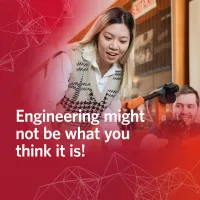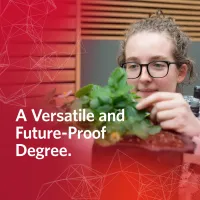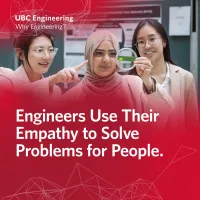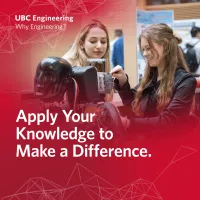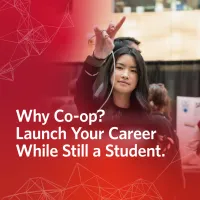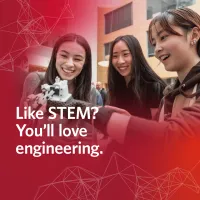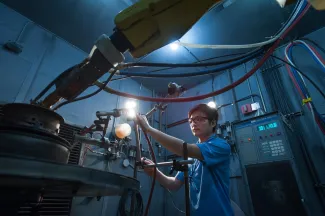"As individuals, we are all responsible for living in sustainable ways, but in engineering you have a broader impact because you are literally selecting what kinds of materials are being used for certain products, as well as the processes to create those materials."

Karisma Jutla
- Degree:
- Bachelor of Applied Science
- Program:
- Campus: Vancouver
Why did you want to study engineering?
Growing up, I was interested in so many different things. I was initially set on being an author and then a physicist, but after participating in some engineering outreach activities I realized that engineering could be a way for me to apply my passion for physics.
Engineering combines so many things I am interested in—I am a creative people-person who also loves hands on activities and getting stuff done.
How did you choose Materials Engineering?
I’ve always been interested in sustainability, and materials engineering is really at the heart of that. There’s no better place to be if you want to make an impact on sustainability given that everything is made of materials.
While I was in first year, a lot of my upper-year friends were in materials engineering and they loved it. I saw how supportive the community is and how it’s a great place to learn. I also liked that there are so many opportunities in materials engineering and you can take the degree in countless directions and career paths.
Tell us about your work with the Engineering Undergrad Society.
I’ve been involved with the Engineering Undergraduate Society since 2019, taking on roles of increasing responsibility and just finishing up my term as president. In first year, I attended E-Retreat, where about 100 first years go to Gambier Island for a weekend. It was a great way to get to know other first-years and upper-years outside of the classroom, and I actually met my best friend on that trip!
After seeing everything the society was doing to help students, including their tutoring sessions—which really helped me make it through first year—I decided to get involved. Some highlights were being VP Communications during COVID, where I coordinated a lot of online programming, including first-year orientation.
I also helped run Engineering Week, which is a big event on campus where over 1,000 students compete for their departments and get to know each other. It’s a super fun opportunity to apply your engineering skills in very interesting ways! I became VP Finance and ran the largest Engineering Career Fair UBC has ever seen—and the largest Engineering Career Fair in Western Canada!
One project I’m most proud of is the ESC Eatery, a volunteer-run café in the Engineering Student Centre. It was shut down during COVID and then I and a team of three EUS directors decided to restart it. There are over 60 volunteers there every week preparing low-cost foods for students. As president of the EUS, one of the first things I did was to drop all our prices. The result has been a huge increase in sales—last year we sold about 10 times as many sandwiches as we did the prior year. More importantly, we are feeding hundreds of students everyday in the face of massive food insecurity.
Engineering Undergraduate Society ESC Eatery
Any co-op or work experiences you’d like to share?
Co-op is a great way to acquire more hands-on experience and gain greater understanding of what it means to be an engineer. Last summer I worked at Pepsi in a production co-op position. It was an incredible opportunity and an amazing job. It gave me opportunities to apply the skills I’d developed in both my volunteer work and my studies—and I figured out that I really like project and people management! When you’re working with crew who started working at the company decades before you were born, you learn to be extremely collaborative and always open to their new ideas.
UBC Applied Science Co-op Pepsi
Do you have any advice for female students who are considering engineering?
For advice: go for it. Take physics, do outreach programs. Try it out. Maybe it isn’t for you, but maybe it is, and don’t let any perception someone has given you hold you back. This path is open to you, and even though there are more men in this program, the close bond you form with other women in the program is so special. There’s a lot of camaraderie, and we all understand the base experience.
Being a woman in engineering can be complicated. It’s better in school than it is in industry. If you look at the stats, there’s a real drop off in the number of women who obtain their PEng compared to the number of women who graduate with an engineering degree. I think it’s important to empower women heading into the workforce to give them a sense of what to expect and how to succeed. We may be reaching our goals in enrolment in school, but when you actually look at the women who go and become engineers, the numbers are still too low. I think this is one of the values of co-op, in that it gives young women exposure to the industry and a clearer picture of what it’s like.
This was one of the motivations behind the work I did to organize the 14 Not Forgotten Ceremony in December 2023. President Benoit-Antoine Bacon attended, and we then had speakers representing women at different points of their engineering career, including a first-year student, myself, a young EIT, someone with several years of experience and a senior executive. It was very meaningful to hear and learn from other women in engineering.
14 Not Forgotten Ceremony President Benoit-Antoine Bacon
